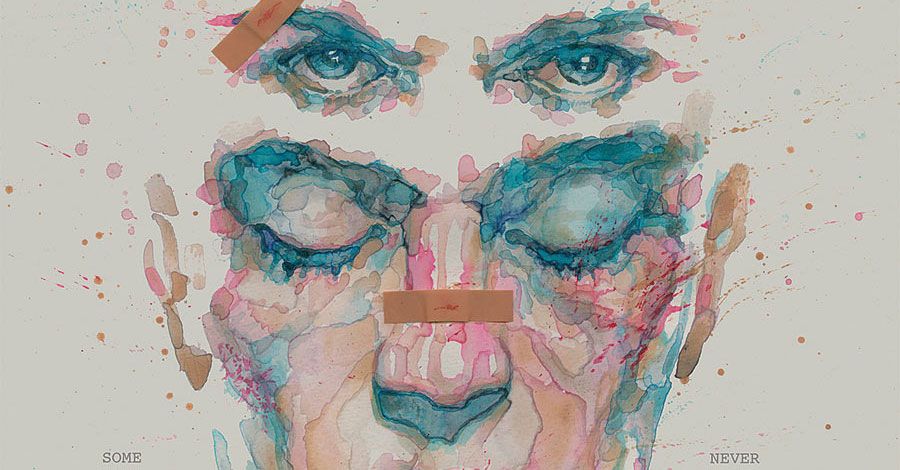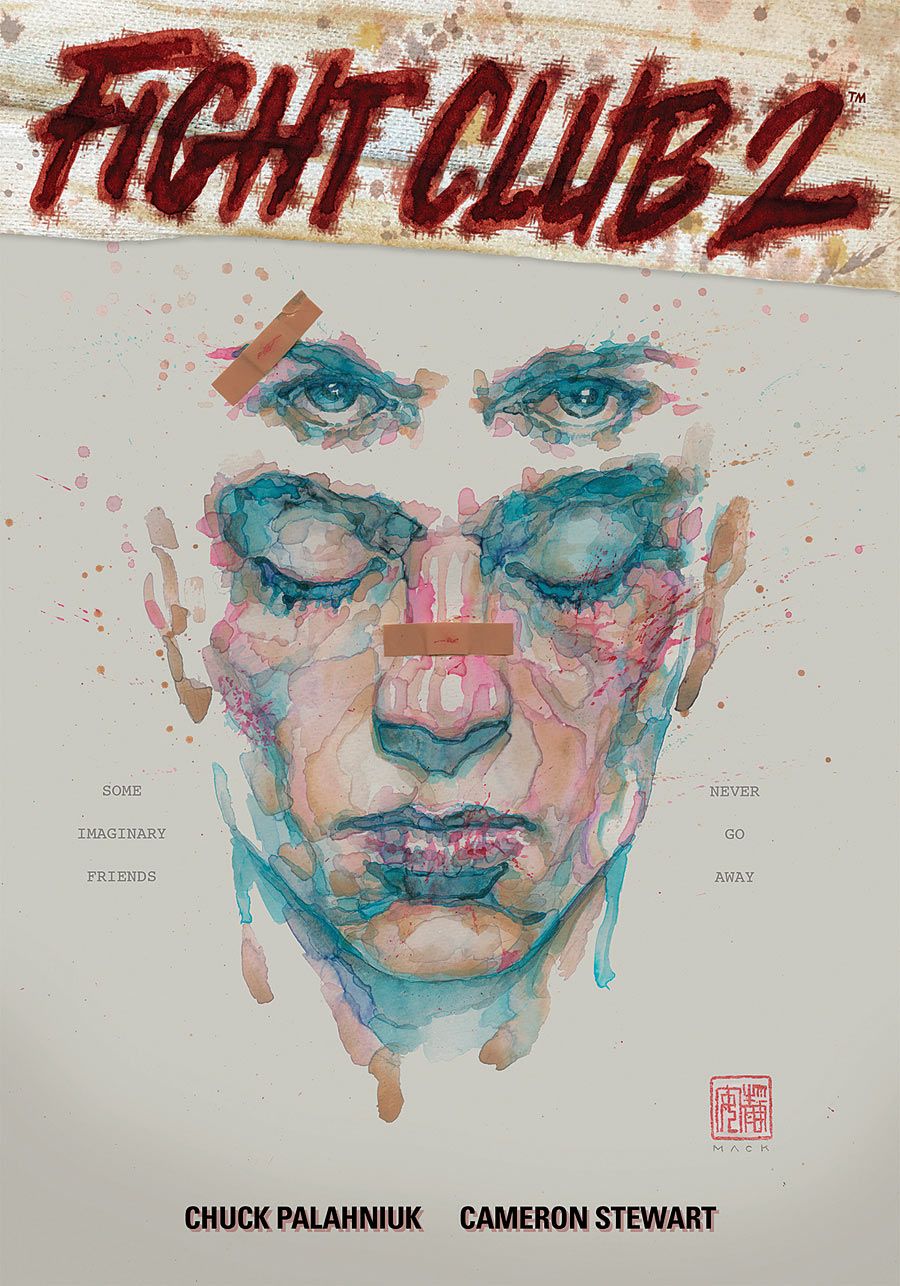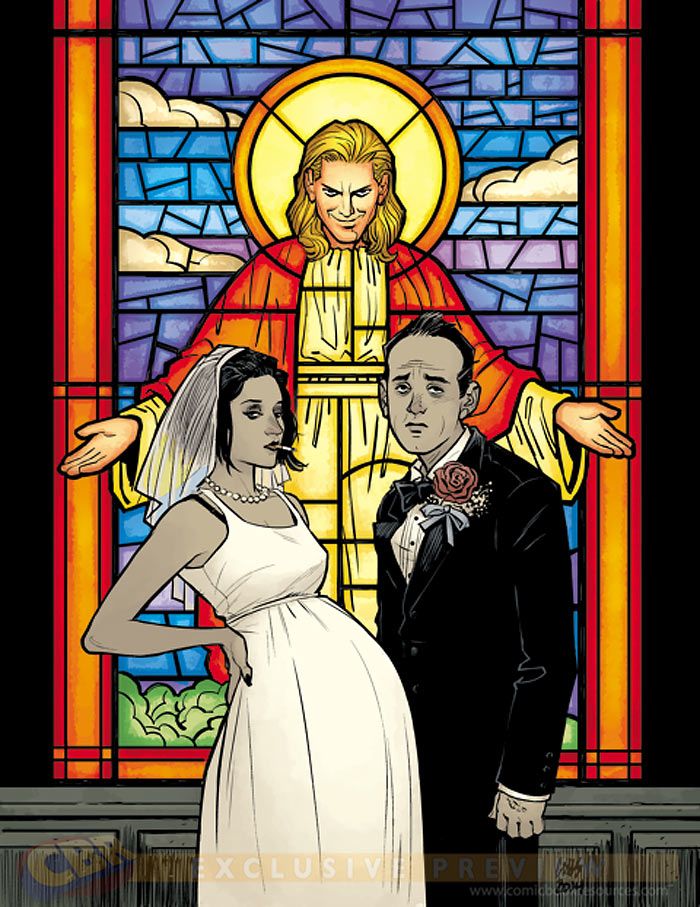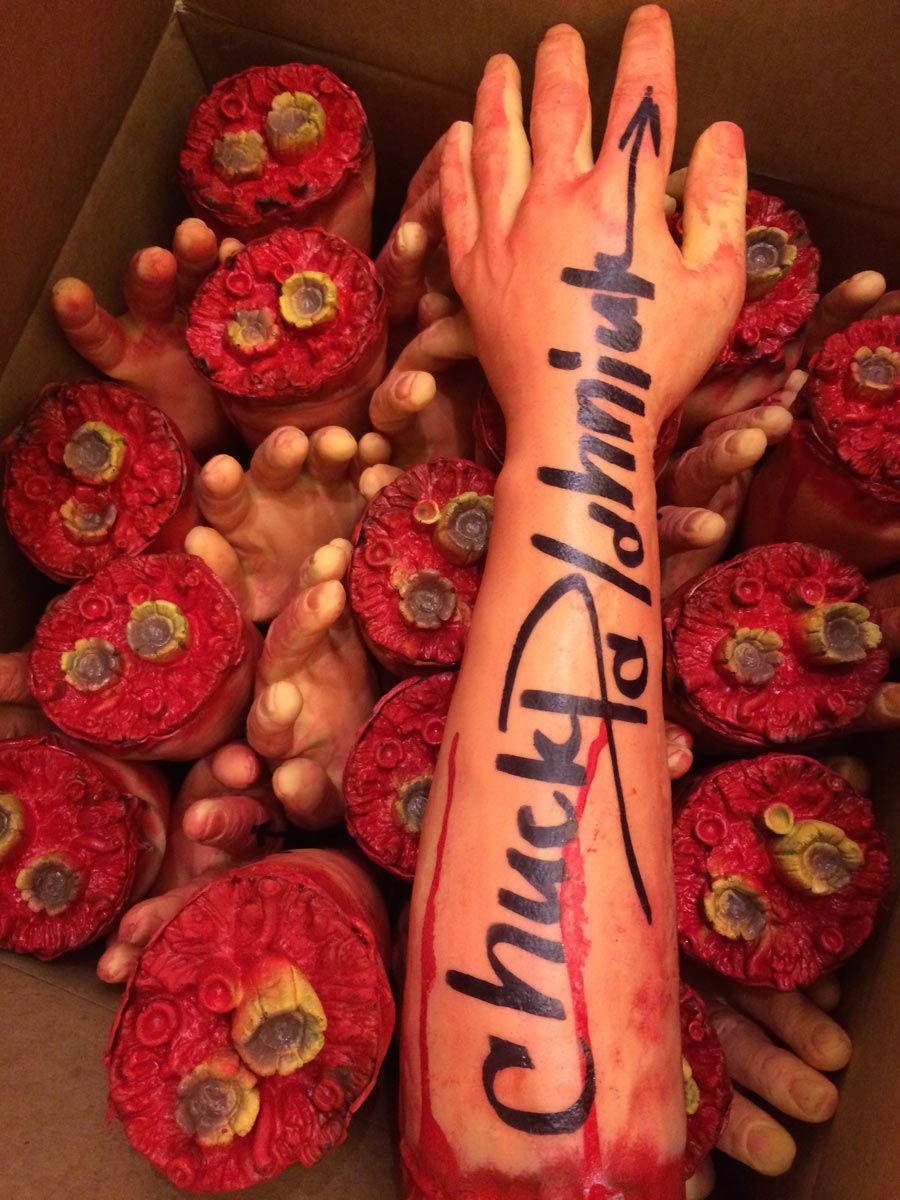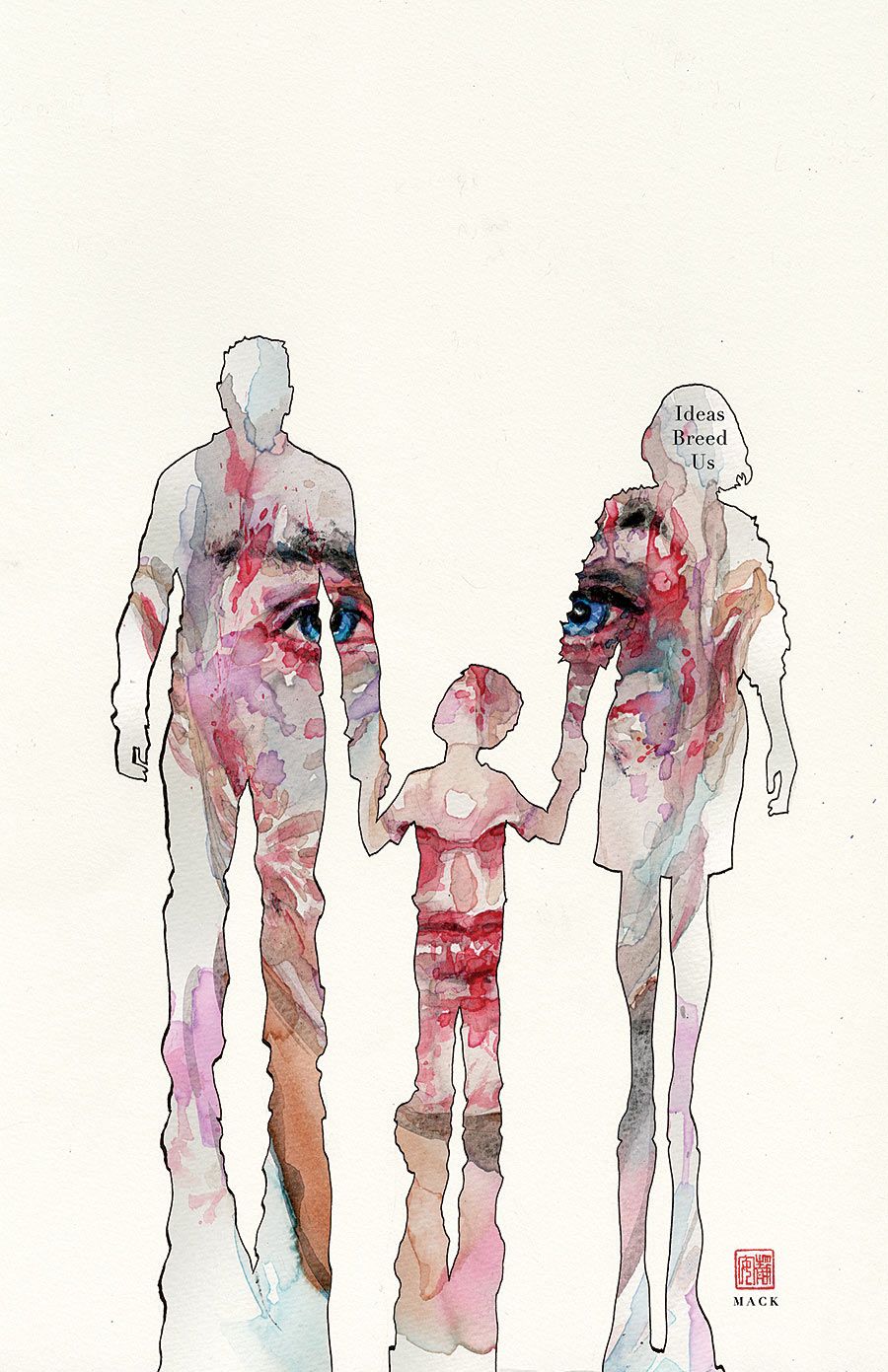It's may sound absurd that the idea for a comic book sequel to the iconoclastic novel "Fight Club" was conceived at a dinner party, but audacious author Chuck Palahniuk apparently goes to way cooler dinner parties than you or I.
Surrounded by pros in the comics industry, the prolific novelist found himself inspired and encouraged to resurrect the tale of his iconic mayhem-maker Tyler Durden with panels and splash pages. And so "Fight Club 2," which picks up with its narrator married to Marla and warring once more with Tyler, was born, filled with menacing meta-humor, outrageous proclamations, and the kind of provocative violence only Palahniuk could dream up.
RELATED: Chuck Palahniuk's Salacious "Snuff" to Become Racy TV Series
The 10-issue Dark Horse Comics series, featuring art by Cameron Stewart and Dave Stewart, and covers by David Mack, has rightly won scads of praise, paving the way for what Palahniuk promises will be an even more boundary-pushing sequel, "Fight Club 3." We sat down with Palahniuk for an in-depth interview about "Fight Club 2"s creation, his transition to comic construction, his conflicted feelings about David Fincher's "Fight Club" film adaptation, his own legacy, and -- of course -- Tyler Durden.
CBR News: We're coming up on the one-year anniversary of issue #1's release. What's the fan reaction been to "Fight Club 2?"
Chuck Palahniuk:Boy, you know -- I try to stay away from people's reactions. But from what I've seen, it's been very positive. The stores have been really happy; I interact with the stores, the independents a lot, and for the most part, what I know from myfriendsis that they like it. They were very happy with the book itself.
With "Fight Club 2" and "Invisible Monsters Remix," you've sort of returned to the scene of the crime of some of your earlier works. What drove you to further explore these stories?
With "Invisible Monsters," it was the fact that there was a petition circulating requesting publication of a hardcover. There'd never been a hardcover of "Monsters," and the publisher wanted to put one out, and asked if I wanted to write an introduction. I counter-proposedrestructuringthe book the way I had originally written it, a non-linear form that nobody had wanted (at the time). That was how "Monsters" happened, was this petition really leveraging things.
With "Fight Club," it was really a dinner party and friends of mine introducing me to [comic book writers] Matt Fraction and Kelly Sue DeConnick andBrian Michael Bendis. And then, the group of themreallycampaigning and lobbying me to write the sequel as a comic, and then also offering to coach me in learning the craft of comic writing.
Writing a comic seems like a radically different process from writing a novel. How did you manage that adjustment?
First, my novels are always really dialogue light, so I had that going for me. And I always emphasized action and gesture in my novels, so I had that going for me as well. The other aspects of learning structure were just a skill to pick up. They were small compared to the things I did already. I already heavily plot things, so coming up with 12 reveals per issue -- for each page turn -- wasn't a big deal for me.
That kind of sounds like how you end your chapters, with this "page-turner" element that makes the reader anticipate turning the page.
Which is something I picked up from Armistead Maupin when he wrote his serialized "Tales of the City," how he always works in multiple plot threads so he can alternate between them. You were so constantly off balance because things would end on a cliffhanger, and then you would have to go through two or three other plot threads before you came back to the thread you might be most engaged with.
How did Cameron Stewart come to be involved?
We looked atso manyartists. Scott Allie at Dark Horse showed meartist after artist, and Cameron was the one that drewliteralenough that I thought he could carry alotof plot, just an ongoing amount of reveals and things happening. But he also drewcartoonyenough that I could use things that would just beheartbreakingif they were drawn too realistically. The idea of these children with a terminal disease [progeria] would just emotionallyexhaustthe audience. They would be the entire story. But Cameron is able to draw thingscartoonishenough that people have some distance from thetruereality of them.
One thing that really struck me with "Fight Club 2" is how meta it is. Not only does it reference the book's story, but also the movie's existence, the fandom and yourself. Do you feel the medium of comics was uniquely helpful in the execution of that meta exploration?
I think so, definitely. You know, David Fincher had asked if I wanted to be in the movie, and I couldnotstomach the idea of seeing myself in the movie. But I knew Cameron could draw me flatteringly enough that I wouldn't be sickened every time I had to deal with a panel and an image of myself. So, yeah. [Chuckles] Comics make everything looksomuch nicer.
Who would you have played?
I would have been just someAlfred Hitchcock personwalking through the frame, or sitting in the background. But it would have really ruined the spell of the story for me to suddenly see myself in it.
I think you should just tell people youarein it. People obsess about this movie so much that there'd be those claiming they'd seen you.
[Laughs] That's a great idea! I should have done that. There's so many things I should have done.
It's like a Tyler Durden Easter egg; it doesn'tactuallyexist, but people are like, "No, no, no. Itotallysaw him. At minute 32, if you pause just right -- "
Yeah! [Joking] Someday Fox will recut it and put me into it.
DVD is really where "Fight Club" took off, right?
Exactly. It was just a slow motiontrainwreckin the theaters. It wasn't until the DVD and it was being shown on cable that it really took off.
"Fight Club 2" suggests you have conflicted feelings about the film adaptation. Can you tell me about that?
Well, I have conflicted feelings, but I am also enough of a realist to know why David did the things the way he did. David had to have anupbeatending. David couldn't include the kind of socialjudgmentthird act that book had, just because of time constrictions.
There's a really unique 3D element of the comics, where items like pills and rose petals block out parts of the panels. Tell me how this idea came about.
Right from the beginning, Scott and Cameron and I wanted to do some kind of meta thing, the way David Fincher did meta things within the movie, you know -- catching the frame in the gate.
And the cigarette burns and such.
Right, and burning and breaking the film and splicing things into the film. So we thought, what are the kinds of mechanical qualities of comics that we could manipulate? Getting the register wrong or collapsing and making the panels go all wonky during scenes of violence, making the inkrun.Just all these kind of meta things that would apply only to the medium of comics. The other thing is to lay things over the page, eithernegatingpeople's expression so that they seemed insincere, ornegatingthe clever things that they were saying.
Some of the most clever things, like, "A Vicodin! A Vicodin! My kingdom for a Vicodin!" Dave Stewart, the colorist, would put a flower petalrightover that, so the clever bit would be obliterated. Which is kind of anti-comic, because so often comics are about the superhero saying the clever thing. I really wanted to play against that. If it was clever, then I wanted to cover it up and hide it.
That seems to tie into the page where you're explaining why Tyler would attack art. It's actually a crash course in great works of art being vandalized, like "Guernica," "Mona Lisa," "The Pieta." What do you think inspires such intense reactions to these classic works?
It's all across the board. Some people, after they've been arrested, say that they felt such aconnectionwith the art work that they had to -- in one case -- kiss it.A woman who left a lipstick mark on a famous painting [said that]. And other people feel that the past dominates the present, so they have todestroythe past if art of the present is going to have any chance. People who feel whatever antagonism towards the past.
In "Fight Club 2," you present yourself as a character. So, as the creator of the comic, you have things purposely obscuring the clever bits of the work. And then, as the characterwithinthe comic, you're actually trying to destroy Tyler.
I think that any author lives this kind of conflicted relationship with their best characters, where you know that, as the author, I am someday going to be dead and rotting and gone, but there's a good chance that my characters -- in particular Tyler -- will live on in people's minds. So how do you go about putting the genie back in the bottle?
Is that something that frightens you, or thrills you? The idea that of a legacy that goes on without you?
It kind of irritates me [Chuckles] because the book wasso slowin becoming any kind of a seller. I mean, it took ten years before the book really had any kind of sales. Then, the movie tookfive yearsto gain any kind of an audience. It just feels like, by the time I have any success as an author, I'm going to bedead.
Do you not consider yourself a successful author?
No, not really. It's still quite a slog. It's a tough job.
I mean, I understand it being a tough job, butyour works have been so seminal, not just in literature but -- as you explore in "Fight Club 2" -- in the greater pop culture. But then, I guessin a way, that's sort of out of your control. Hmm.
Hmm... There's a certain part of me -- a blue-collar background part of me -- that doesn't think of writing as legitimate work. So no matter howhardI do it or what I accomplish with it, it's never going to feel like a success, because it's justnota real job.
I can understand that. Often when I explain what I do to people, I feel like I need to be defensive a bit. Like, "Oh, you're a lawyer? I don't have a real job. I write."
[Laughs]. Yeah, see! And then everyone's like, "Oh,yeah, I write too."
Yeah, exactly! And it's like, "Yeah, that's totally the same. That's cool." [Laughs]
I was personally pleased to see women get involved in Tyler's plans, because as much as "Fight Club" has been heralded for its depictions of male rage, it was a book and a film I, as a teen girl, felt deeply connected to. You've also written female-fronted books from "Damned," and "Doomed," to "Beautiful You." Do you think there's a difference between male and female rage?
Oh, boy, rage. [Pauses] Boy! I don't think so. I would say no. But I don't really think of my characters in terms ofgender.Typically, I tend to flop the gender. "Beautiful You" for instance, was a big novel about arousal addiction and how it rewires your brain and it makes youcrazyand it makes you dissatisfied witheverything. Arousal addiction tends to be something identified more with men with gaming and pornography and whatever, but Iknewthat if I wrote it as a novel about male characters, it would be too close to home and people would shut down. So I flopped the genders, just to distance it, and then maybe people wouldgetit if it wasn't quite so threatening.
My characters really don't really have a gender. Yeah. They're almost arbitrarily male or female.
What do you feel your responsibility as an artist is to your audience?
Boy.To be absolutely honest, I am against any kind of social messaging or social engineering orfixing. I feel like, my entire life I've been subjected to entertainment that's designed to make me a better person, according to somebody else. And I'm just sick of it.
I just want entertainment that's going to surprise me, and maybe make me think about things in a slightly different way. Or it's going toexpresssome unrealized aspect of myself that I'd never really fully looked at.
With books like "Fight Club," I was kind of conducting this ongoing journalist field study of all my male friends, saying, "What do you wish your father had taught you? What are you dissatisfied about?" It was a kind of form of journalism. Beyond that, really, I think my job is just to prove that this thing can be done. Because, where I grew up, I never knew a professional writer until I was in my 30s, so I never saw writing as a possibility. I think sometimes themostimportant thing a writer can do is just be there physically and prove that human beingsdothis job, so thatotherpeople who would consider doing this job would see it as a possibility for themselves. Just toliveand breathe and shake their hand and prove thatpersonsdo this,that'sthe biggest job of a writer.
Speaking to the challenges of being a writer, what do you do when you get stuck? How do you shake yourself out of "writers block?"
Hm. I eitherbewith people -- going out to talk with friends, visiting friends and listening to their stories -- or I do some sort of manual labor that kind of frees up my mind and lets ideas seem to occur.
As the comics points out, Tyler Durden has been divorced from his anarchy origins, twisted into a sort of champion for the enraged who feel the world is failing them somehow. That made me wonder, what would your Tyler think of Donald Trump?
[Laughs] It kind of tickles me that they have the same initials, only reversed, and they are both these blond bombastic characters. I think that they'revery muchalike. They are, in a way, the same archetype, that big, blond, blustery guy who stands on a soapbox who saysboldthings that a lot of people wish that they could say. [Laughs] It's such a funny synchronistic thing: these two blond bombastic podium-occupying people -- a character and a person -- occur at the same time.
You're working on "Fight Club 3" now. It's well on its way, right?
Right. It's going to be 12 issues, and I've written 9. I put it away for 6 months, or 8 months, so I could go back to itreally,really fresh and tear it apart before I complete it. I want to make itfarmore shocking than "2," because I felt with "2" I had topulla lot of punches because I was working with a new medium and I didn't want to overwhelm people. But with"3,"I think I can really,reallydeal with challenging, far more edgy things.
I would never have said of "2," "Oh he's clearly pulling punches," so to imagine what "3" would be when all bets are off, that's exciting.
Well, they just announced an 11-city tour, so I have 11 cities to get through. But boy,what a great collaborative thing comics are. They're so much more fun to write than novels. These two years -- my friends have said -- have been the most fun two years of my life.
"Fight Club 2's" hardcover collection arrives in stores June 28.

